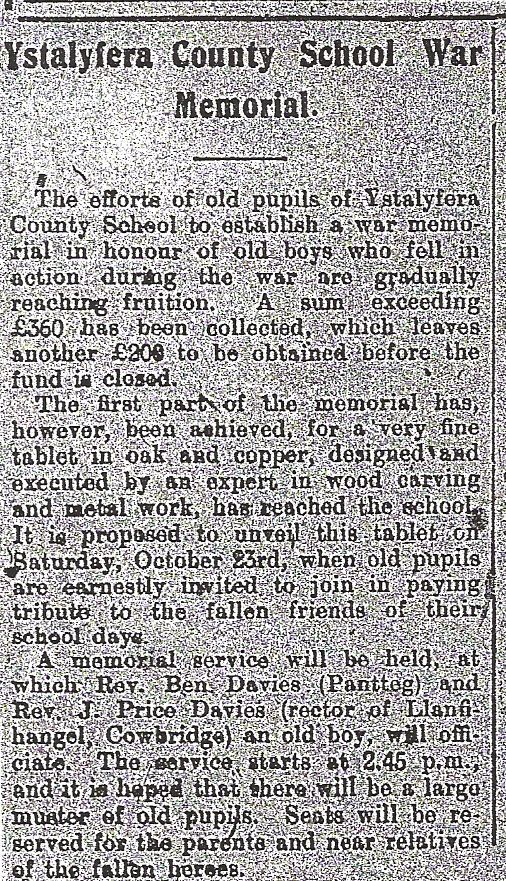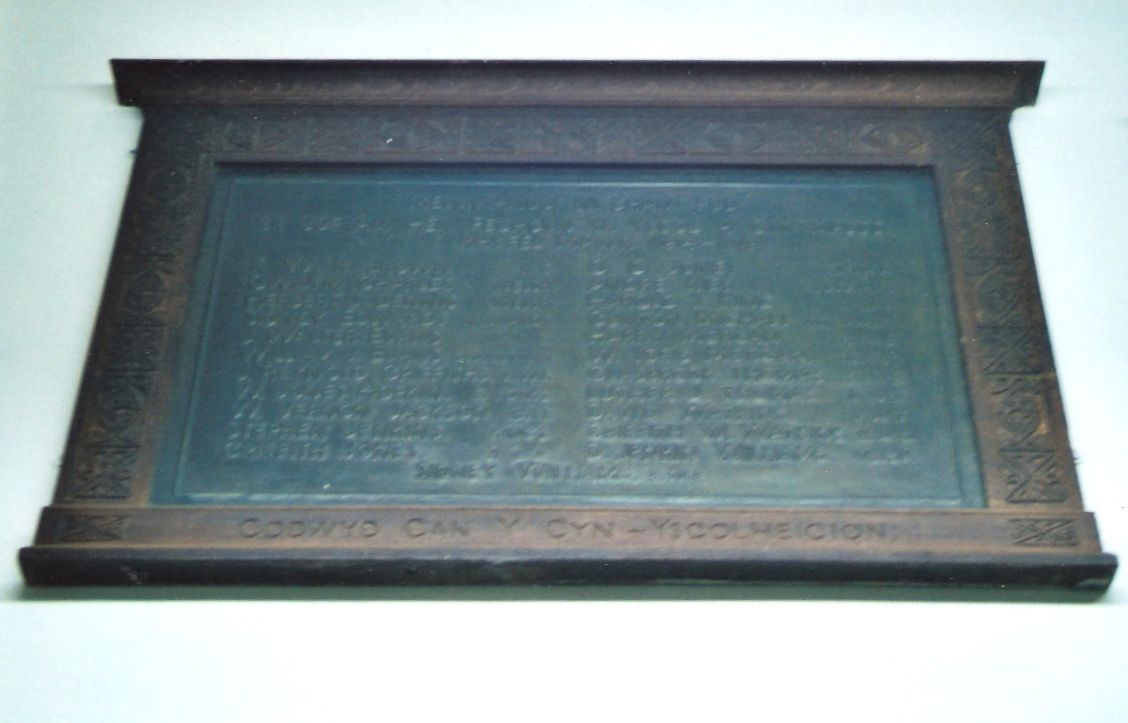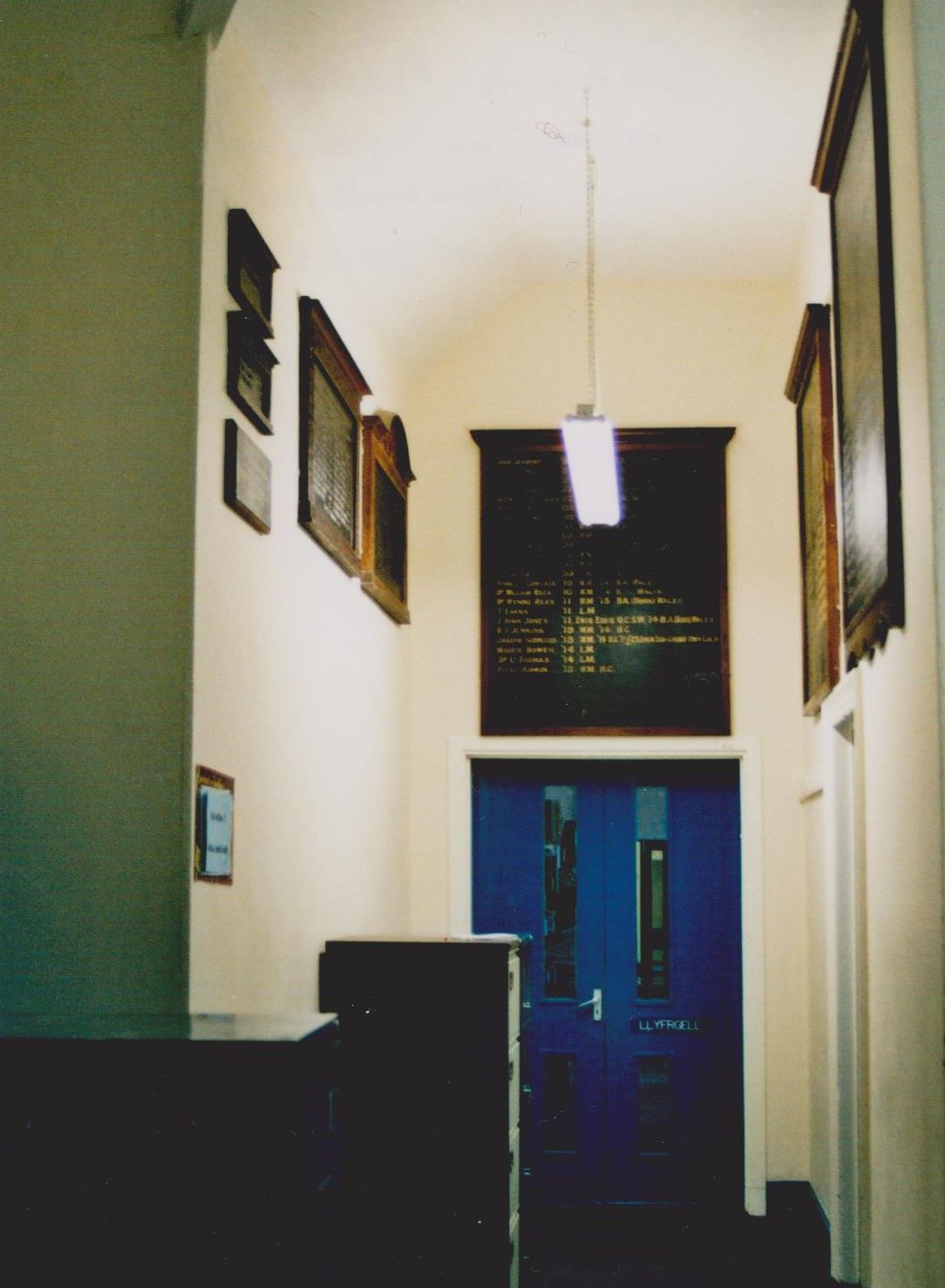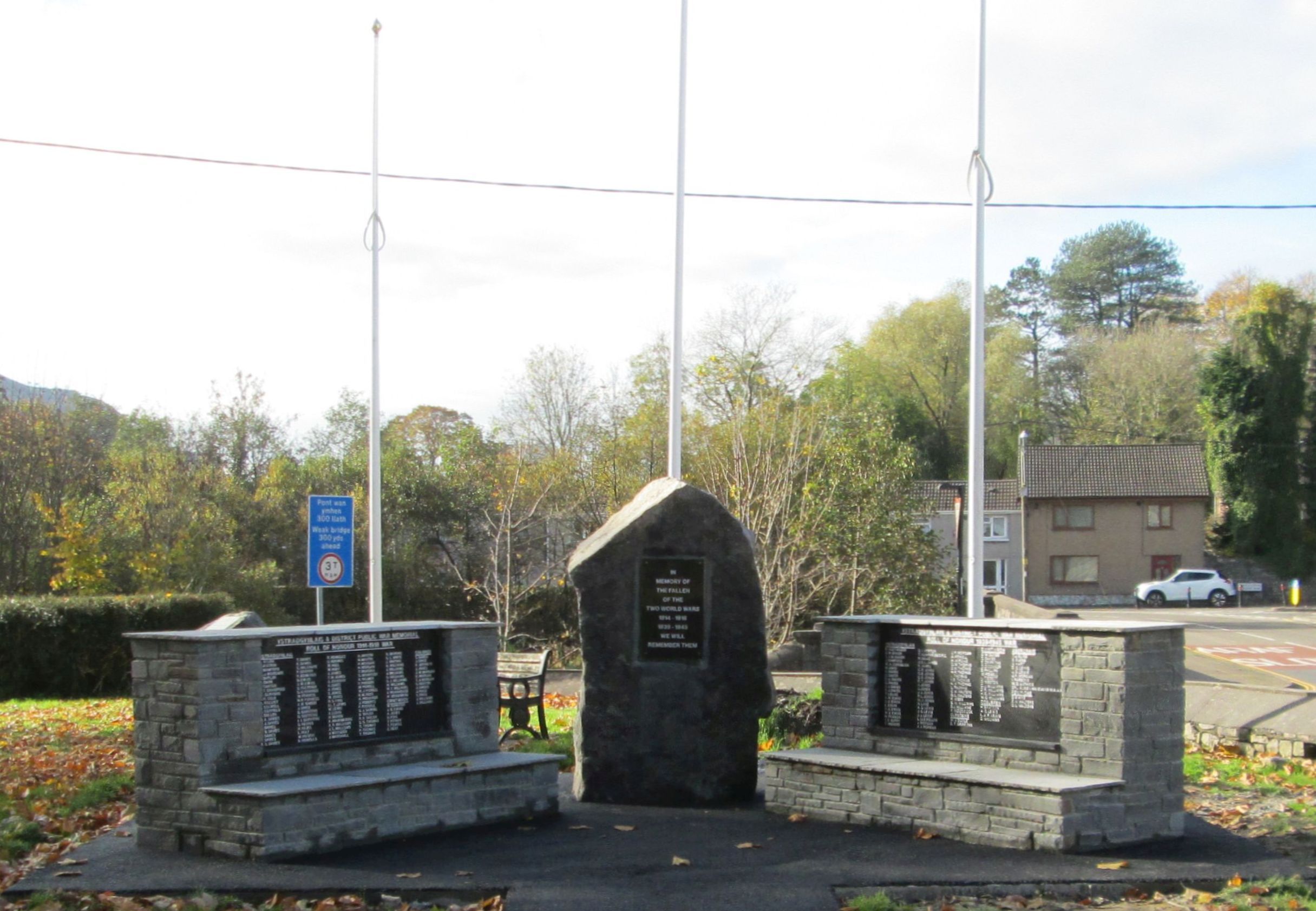Ystalyfera Fallen
War Graves & Remembrance Graves
Ystalyfera County School Memorial
Ystalyfera County School is now Ysgol Gyfun, and the war memorial tablet continues to be preserved in the school hall. It was erected in 1920 after public subscription, in a ceremony presided over by the Principal of Swansea University.
From the Labour Voice newspaper, 1920 :-
Ystalyfera County School War Memorial
The efforts of old pupils of Ystalyfera County School to establish a war memorial in honour of old boys who fell in action during the war are gradually reaching fruition. A sum exceeding £360 has been collected, which leaves another £200 to be obtained before the fund is closed.
The first part of the memorial has, however, been achieved, for a very fine tablet in oak and copper, designed and executed by an expert in wood carving and metal work, has reached the school. It is proposed to unveil this tablet on Saturday, October 23rd, when old pupils are earnestly invited to join in paying tribute to the fallen friends of their school days.
A memorial service will be held at which Rev. Ben Davies (Pantteg) and Rev. J Price Davies (rector of Llanfihangel, Cowbridge) an old boy will officiate. The service starts at 2.45pm, and it is hoped that there will be a large muster of old pupils. Seats will be reserved for the parents and near relatives of the fallen heroes.

|
|
| The newspaper article announcing the ceremony" |
From the Labour Voice newspaper, October 30th 1920 :-
YSTALYFERA COUNTY SCHOOL MEMORIAL
UNVEILED BY SWANSEA UNIVERSITY PRINCIPAL
SCHOOL'S SPLENDID RECORD
Last Saturday afternoon will no doubt be marked down as one of the outstanding events in the history of the Ystalyfera Intermediate School. It was the occasion of the unveiling of a memorial tablet by Dr T. F. Silby, Principal of the University College, Swansea.
The tablet, which was of copper plate in an oak frame, and was executed by Mr Alex A Smith, had been installed in the school hall by past and present pupils in memory of those old boys and members of the school staff who fell in the war. Inscribed on the Roll of Honour are the following names :-
FWP Brown (R.E.)
Gwiliym Charles (Welsh)
Herbert J Dennis (Welsh)
Sidney Edwards (Welsh Guards)
J Walter Evans (R.E.)
Wm. J Evans (Gloucesters)
J Reynold Griffiths (RWF)
W Jones Hopkins (East Yorks)
W Vernon Jackson (RAF)
Stephen Jenkins (King's)
Griffith Jones (RGA)
O G Jones (RWF)
Andre Kies (Belgians)
Harold I King (SWB)
Gunston Michael (Yorks and Lancs)
Harry Morgan (HAC)
W Idris Morgan (R.Fus)
Glasbrook Thomas (SWB)
Luther J Thomas (RWF)
David Watkins (RWF)
Griffith W Watkins (HAC)
D Jenkin Williams (Welsh)
Sidney Williams (RWF)
There was a large attendance of past and present pupils and parents, presided over by Mr John Jenkins, president of the Old Pupils Association. Seated on the platform with the chairman and Dr Silby were the Rev J Pryce Davies, Rector of Goitre, Bridgend; Mr Henry Rees (headmaster of the school); Rev Ben Davies, Pantteg; Mr HJ Powell, J.P., and Mr George Chappell.
Following the commemoration hymn, composed specially for the occasion by the Rev Ben Davies, the Rev J Pryce Davies led in prayer. Then came the unveiling by Dr Silby who, drawing aside the Union Jack that covered the tablet, said it pleased him to perform that duty.
LOOKING TO THE FUTURE
Addressing the gathering after unveiling the tablet Dr Silby said that he counted it a great honour that upon his first visit he should be asked to unveil a tablet to the memory of those old boys of the school who fell in the war. It was not an occasion to speak of the war itself; of what it meant or accomplished, or the destructon, and sorrow it involved. He would suggest that it was for everyone of them present, now that the war was done to get good results out of evil. As he was present as the head of a new college, and speaking upon the occasion of the unveiling of the memorial he would like to say how deeply he felt that the schools and the colleges of this country and others, but more particularly of their own country, had a great charge upon them in seeing that the rising young manhood and womanhood appreciated the
GREAT WORK IN FRONT
of them. All of them knew the war was fought on high issues, and all of them had heard talk of reconstruction and the new world. Such phrases were easy, but accomplishment was another thing. Those of them now able to do some work and take a part in the betterment of the world would be judged by prosperity. All of them who were teaching, formally or informally, had a great charge. He felt it was possble for the universities and the schools to do a great work in something great that could not be expressed in classes, degrees or distinctions, but something that closely touches the thread of life in the sense of the high tone of the boys and girls who went through the colleges.
Speaking as from Swansea, he could say that all associated with
THE START OF THE NEW COLLEGE
were determined to do all in their power to make the new university something that the people in this part of Wales would be proud of, not merely as a teaching institution but something in the whole fabric of the community. He hoped, without speaking of any particular school, that most of the boys and girls present would be with them at Swansea some time or other. He would like to convey from the college, and personally from himself, the assurance that they were looking to homes and schools throughout that part of Wales to send boys and girls to the college.
They regarded themselves as something more than teachers. They would do all in their power to set high traditions and make everyone who came to the college feel that they were members of an institution worth while belonging to. His memories of colleges were essentially memories of a happy time and the tremendous help he received from one or two men. It was the example of those one or two men that had meant so much to himself. He could assure them that at Swansea they interpreted their work as a great work. They were aware that they might fail, but they would do their best to succeed and to justify themselves as something in the national life. In conclusion, he said that he felt he might be allowed to say that he was unveiling a memorial tablet to commemorate the men who fell so that there might be a better world.
All stood with bowed heads as the shrill but solemn notes of 'The Last Post' filled the hall.
CHAIRMAN'S ADDRESS
The Chairman said that he thought it was fitting they should gather there that afternoon to pay homage to the departed and forget for a while the industrial struggle. He rejoiced to think that a simple, beautiful tablet had been erected by the old and present pupils of the school to commemorate for all time the gallant conduct of their friends who had died. Some met a swift death, some had lingered long, while others came back to die as a result of the aftermath of war. It was enough for them that England was in danger, that the homeland was threatened with death and starvation to make them come forward and do what they thought was their duty. The names on the tablet should help boys and girls of the school in the years to come to realise that when the country was passing through a grave crisis, it was their duty to stand by it through thick and thin. They were gathered together to help to perpetuate the memory of 23 true brave and noble men, and in conclusion he said he could only re-echo those oft quoted words of Horace, 'Dulce et decorum est pro patria mori' ('It is pleasant and befitting to die for one's country')
SCHOOL'S WAR RECORD
Mr Henry Rees expressed himself as being very pleased with the presence of Dr Silby. He held, as a headmaster - and he believed Dr Silby held the same view - that there should be a better relationship between the schools and the universities. As far as they had been able to ascertain , 220 old boys had joined the army and 30 joined the navy. Two hundred and fifity was a high number considering that up to the outbreak of war the school was, comparatively speaking a small one being just half its present size. Fifty held commissions, and between them they gained the following distinctions - Five Military Crosses, one Italian decoration, one Distinguished Conduct Medal, four Military Medals, and one Meritorious Service Medal, whilst several were mentioned in despatches. The school was represented in every branch of the service, and its old pupils were to be found in every theatre of war, and every important engagement. Twenty old boys and three masters made the extreme sacrifice, and the Old Pupils Association decided to obtain £650 with which to install a memorial tablet in the school and make a suitable in memorial. The amount in hand was £400 and he had every confidence that before the end of the school year the full amount would have been obtained.
OLD PUPIL'S PRIDE
Rev J Price Davies, an old pupil, said that it was 24 years since he had first stood in that hall, and 16 years had passed since he was present on the occasion of the first re-union. He was always proud of the fact that he was an old pupil of Ystalyfera County School, and to-day he was pouder still, because of the record of the school. He wished to convey from his wife, known to them as a former member of staff, her regret at not being able to attend and her deep sympathy with the bereaved. There had been many re-unions, but this one was unique. It was for them to see that the sacrifices made were not made in vain.
FIGHT FOR RIGHTEOUSNESS
Speaking in Welsh, the Rev Ben Davies referred to the great sacrifice made by the boys from thousands of homes in the country, whilst they were there that afternoon to perpetuate the memory of their local boys who had made the supreme sacrifice. The huge amount of money spent in prosecuting the war on the loss of a large battleship was nothing compared with the loss of a son from a home. The boys who had gone forth to battle had not done so for glorification orr self-aggrandisement but for righteousness and the interests of those who remained.
The meeting was brought to a close by the singing of a special hymn of thanks and prayer by the Rev Ben Davies
A quick note on the army units mentioned in the article:-
SWB South Wales Borderers
RGA Royal Garrison Artillery
RWF Royal Welsh Fusiliers
RAF Royal Air Force
HAC Honourable Artillery Company
RE Royal Engineers
Ystalyfera - South Wales

Email Yeargroup:
yeargroup@hotmail.com
Email Wolfian Design:
webdesign@wolfianpress.com

Click the cover to purchase the paperback
Simone dreamed of becoming a showbusiness star during her nights in the air raid shelter in the garden of her home in Southall, during World War Two. After joining the A.T.S. in the war, she became part of the concert party entertaining the troops, eventually joining the Windmill Theatre.
Roll of Honour 1914-1918
FWP Brown
Gwilym Charles
Herbert J Dennis
Sidney Edwards
J Walter Evans
J Reynold Griffiths
W Jones Hopkins
W Vernon Jackson
Stephen Jenkins
Griffith Jones
OG Jones
Andre Kies
Harold I King
Gunston Michael
Harry Morgan
W Idris Morgan
Glasbrook Thomas
Luther J Thomas
David Watkins
Griffith W Watkins
D Jenkin Williams
Sidney Williams


The corridor at Ysgol Gyfun where memorials and scholarships hang




